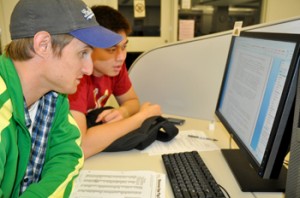USC Libraries adds digital resources
Whether you’re looking for that 50-year-old copy of Vogue magazine or the world’s oldest continuing database of animal biology, USC Libraries will soon have you covered.

Search · Senior Alwin Sasmita and junior Oivind Naess access one of the computers at Leavey Library that will soon feature new online resources. - Mannat Saini | Summer Trojan
USC Libraries announced an addition of 33 new electronic resources Monday, including the popular fashion magazine and Zoological Record, adding to an already extensive collection of resources available to students, faculty and staff.
The new resources, which will be available by mid-July, includes new material library officials have been wanting to add to the electronic collection for some time.
“These research resources are far greater in number and far more in-depth and authoritative than what you might find through a typical Internet search,” said Lynn Sipe, associate dean for collections. “In many cases, these are electronic versions of extensive, primary resources that span many disciplines and geographic regions.”
Some of the more notable additions to the USC Libraries’ digital database include two ProQuest/LexisNexis collaborations on United States politics. Included in the addition is a database on legislative insight as well as a database of previously unpublished United States Senate and Congressional hearings.
Christian Grose, assistant professor of political science, recognized the importance of these often hard-to-find resources.
“Having these extensive databases is very useful for students and faculty and for anyone who wants to understand Congress or politics,” Grose said. “USC is ahead of the game.”
Gale, the educational publishing company, will provide many of the additions, including correspondence from prisoners held in German concentration camps just before and during World War II as well as databases that explore the world after the end of the war, both from the viewpoint of governments and those who experienced the Holocaust first-hand.
Stephen Smith, executive director of the USC Shoah Foundation Institute, which has already archived nearly 52,000 video testimonies from Holocaust survivors and witnesses, lauded the additions.
“[The addition] will contribute to our continued efforts to develop USC into an internationally recognized destination for Holocaust and genocide studies,” Smith said. “We eagerly anticipate the launch of these new offerings.”
The addition of new resources is the single-largest since the libraries announced 59 new sources in July 2010.
More than 250 books written between 1962 and 1986 will be available for students electronically as part of the addition of the African Writers Series to the library’s digital database.
The series includes work from the likes of Chinua Achebe, noted Nigerian author; Steve Biko, outspoken South African anti-apartheid activist; and Nadine Gordimer, South African political activist.
Additions to the library’s digital resources, which can be accessed via the E-Resources tab at the library’s landing page, also include works on medicine, music and engineering.
